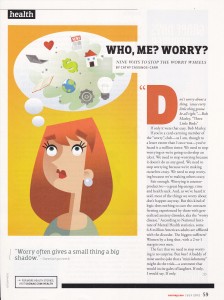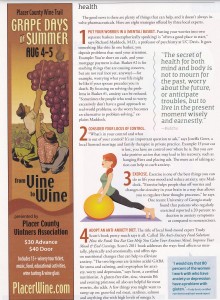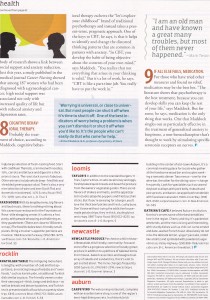
Here are Nine Ways to Stop the Worry Wheels. These were featured in the July edition of the Sacramento Magazine. I’m thrilled to have contributed to this super article and I am happy to share it with you here! I hope you enjoy it and find these nine ways helpful for stopping your worry wheels and anxiety.
- Put your worries in a (mental) basket
- Consider your locus of control
- Exercise
- Adopt an antianxiety diet
- Practice mindfulness
- Tune in to the five senses
- Connect with others
- Cognitive behavioral therapy
- If all else fails, medication
I really like that this fits in perfectly with the holistic approach that Richard and C.R. Zwolinki advocate on their Therapy Soup blog on Psychcentral
(Click on each image below to enlarge.)
Yet again, writer Cathy Cassinos-Carr has done an excellent job with this article. You can read another of her great articles here: Sweet Misery: Seven spoonfuls of wisdom about sugar
If you’d like more information on the antianxiety diet, a great resource is my book The Antianxiety Food Solution: How the Foods You Eat Can Help You Calm Your Anxious Mind, Improve Your Mood and End Cravings, available in major books stores, at Amazon and via www.antianxietyfoodsolution.com





